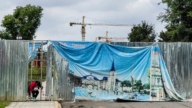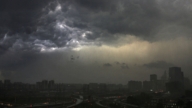【新唐人2013年11月01日讯】房地产泡沫已经成为中国经济增长的最不可预测的因素,令各界担忧。日前,中共国务院发展研究中心主任李伟,证实大陆三、四线城市出现房地产泡沫破裂的现象。
10月29号,中共国务院发展研究中心主任李伟,在“世界工商协会论坛”上透露,根据国研中心的调研报告,大陆房地产市场的风险在进一步积累,不但区域性分化的趋势越来越明显,三、四线城市的楼市供大于求,温州、鄂尔多斯等地的房价已经开始下跌,出现了泡沫破裂的现象。
李伟认为,有多少三、四线城市的楼市出现泡沫破裂,以及严重程度,还需要数据支撑,他表示,“很多时候想拿到真实的数据并不容易”。
美国南卡罗莱纳大学艾肯商学院教授谢田:“实际上在大概一、两个月之前,中国房地产市场泡沫破灭的迹象就已经出现了,很多南方房地产投资商,开始大举的抛售房地产,价格在很多地方已经开始大幅度下降,并且中国房地产市场,有价无市的现象,也被很多报导给指出来。”
10月28号,美国《福布斯》网站刊登《在中国,没有一座城市没有可怕的大片空房》,文章说,中国城市里有很多空房子,住房供应严重过剩,中国房地产“泡沫总会破灭”。
美国一家名为商业内幕的网站,公布了郑州市郑东新区的卫星图片,并从图片上判断,这只是“一片空屋的堆积”,可能是中国最大的“鬼城”。作为房地产泡沫的最终表现,“鬼城”危机正在中国三、四线城市蔓延。
前不久,国务院发展研究中心发布的“383改革方案”中,涉及了房地产和土地制度改革,其中提出﹕房产税将从试点到全面实施。
大陆经济学家郑先生:“地球人都知道了,现在官方也早就知道,为什么要调控,之前的调控就说明房地产的那种不正常的上涨,它会带来对其他行业的冲击,破坏经济的良性循环运转。”
李伟指出,中国一线城市的房地产泡沫,正在进一步膨胀。
谢田:“中国房地产泡沫已涨到远远超出了中国民众的承受和购买能力,这些房地产,更多的是在中共的权贵有钱人和国企他们之间手中流来流去,没有更多的老百姓把他们的财富积累,或者是储蓄金拿出来投资房地产的时候,房地产泡沫就没有办法继续。”
中国房地产泡沫已经被世界各国的金融界所预见,并纷纷发出警告。投资大师、索罗斯基金管理公司创始人乔治•索罗斯(GeorgeSoros)表示,现在投资中国房地产市场将承担重大风险。经济学者分析,中国房地产泡沫将来破灭,比日本90年代房地产崩盘的情况要严重。
美国“南卡罗莱纳大学艾肯商学院”教授谢田分析,一旦出现大规模的房地产泡沫,将会引发连锁效应,不但会严重打击房地产投资者的信心,也会打击老百姓购买房地产的信心,人们一旦看到价格大幅下跌,就会收紧钱包,继续观望,很多刚买的人也会后悔,甚至会违约撕毁合同,都这样做,将导致泡沫继续破灭。
国研中心表示,期待这次三中全会能够出台一些调控的长效体制机制。
谢田:“中国房地产整个市场的崩盘,从三线、四线扩展到一线、二线,很可能就会在下面的一、两个月之内发生,所以这是一个非常严重的灾难性的后果,至于解决的方法呢﹖在中共这个统治下,基本上没有解决的方式的。”
谢田指出,中共目前还没有愿望去惩治所有贪官,因为直接涉及中共权贵贪污或掠夺来的资产如何重置的问题。谢田认为,现在更大的问题,则是房地产市场泡沫破灭,将拖累中国的银行业,人们将看到中国银行业更大的危机即将到来。
采访编辑/常春 后制/舒灿
China’s State Council’s Think Tank: The Property Bubble Is Bursting
China’s property bubble has become an unpredictable factor
for it’s economic growth, and is the concern of many.
Recently, Li Wei, director of the Development Research
Center of the State Council (DRCSC), confirmed that
the real estate bubbles in third and fourth-tier cities
were initially bursting now.
At the World Industrial & Commercial Organization Forum
on Oct. 29, DRCSC director Li Wei said that according to
the DRCSC survey report, risks in Mainland China’s
real estate market continue to accumulate.
Not only are differences between real estate markets
in different regions becoming more obvious, property bubbles
in oversupplied third and fourth-tier cities are bursting.
For example, the property prices in Wenzhou
and Ordos City have begun to fall now.
Mr. Li says more data is needed to determine the total number
of cities affected and the extent of the severity.
Li says, “most of the time it’s not easy to access the real data.”
Professor Xie Tian of Aiken Business School of University of
South Carolina: “In fact, signs of China’s bursting property
bubble emerged around one or two months ago.
At that time, many property investors in the south of China
started to sell properties.
Property prices in many areas are dramatically dropping.
Moreover, the phenomenon of few buyers on
the property market has also been reported on many times.”
An online Forbes article published on Oct. 28 titled,
“In China There’s Not One City Sans Terrifying Stretches
of Empty Houses”, says many Chinese cities have many
empty apartments and a serious oversupply of housing.
It says China’s property bubble “will burst”
U.S.-based news website Business Insider posted a satellite
photo of Zhengdong District of Zhengzhou City.
The picture shows “massive new construction projects
that sit forlorn and empty after completion”,
which might be the largest Chinese “Ghost City”.
As the final sign of the property bubble,
the “Ghost City” crisis is spreading among
Chinese third and fourth-tier cities.
Not long ago, the DRCSC issued the “383 Reform Plan”,
which involves housing and land system reforms.
The plan suggests that the property tax
should be fully implemented after the pilot trials.
Chinese economist Mr. Zheng: “Everyone in the world knows,
and the officials have long known,
why the property price needed to be regulated,
the previous price regulation policy shows
the abnormal fast-inflating price will impact other industries
and ruin a positive economic cycle.”
Li Wei says the property bubble in the first-tier
Chinese cities is inflating further.
Xie Tian: “China’s property bubble has soared to
a level far beyond the affordability and
the purchasing power of Chinese people.
These properties are more likely traded among
the Chinese Communist Party (CCP) elite circles,
the wealthy, and the state-owned enterprises.
Once there are no more ordinary people investing
the property by their accumulated wealth or bank deposits,
then the bubble will be no way maintained.”
The bubbles of Chinese real estate have been predicted and
warned by the financial field across the world.
George Soros, investment guru and creator of
Soros Fund Management Company, says investing in China’s
property market now will be a major risk.
Economists say that China’s property bubbles would burst,
and the consequences were more severe than
the Japanese property collapse in the 1990s.
Professor Xie Tian says that once large scale
property bubbles emerge, a series of chain effects
will be triggered, which will deal a heavy blow
to the confidence of property investors and ordinary people.
As a result, once they see the dramatically dropping prices,
they will not buy and will keep watching.
Many who will have just made purchases will also regret it,
or even default and scrap their contracts.
These will intensify the bubble’s bursting.
The DRCSC says that it could be expected to
see a long-term price regulation mechanism in the upcoming
Third Plenary Session of the 18th CCP Central Committee.
Xie Tian: “The collapse of Chinese property market will
spread from third and fourth-tier cities into
first and second-tier cities, which might happen
in the following one or two months.
So this is a very seriously catastrophic result.
What is the solution for this?
Under the current CCP regime, basically, there is no solution. ”
Xie Tian says the CCP is unwilling to punish all corrupt
officials, as this directly involves the issue of how to dispose
of the property assets stolen by corrupt CCP elites.
Xie says the bigger issue is the bursting property bubbles,
which will encumber the banking industry, and hence
a greater crisis is impending for China’s banking industry.



























